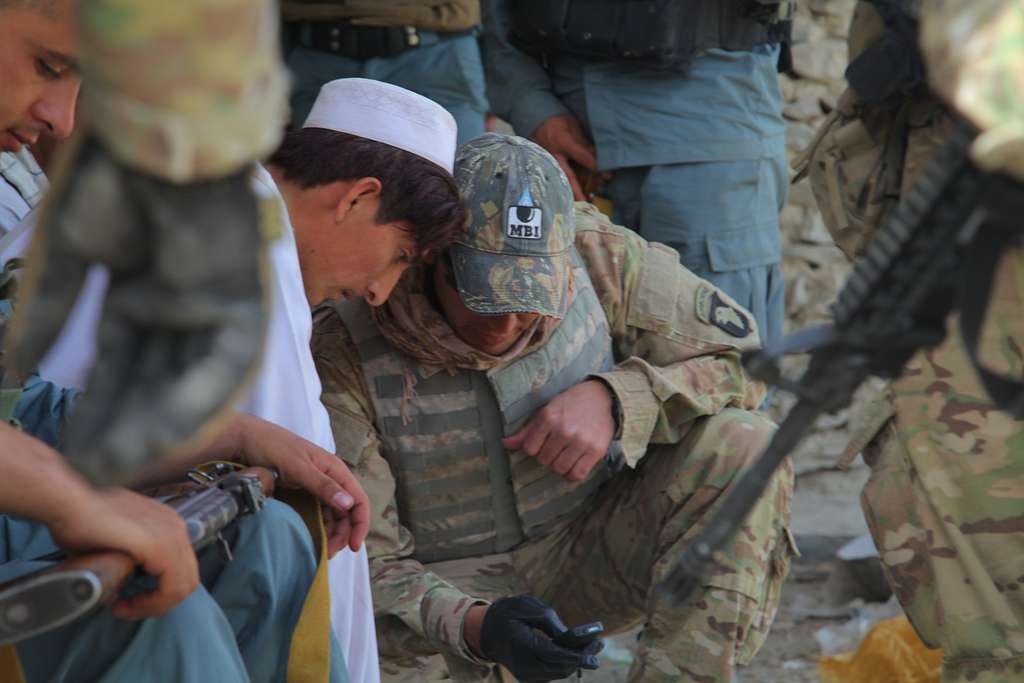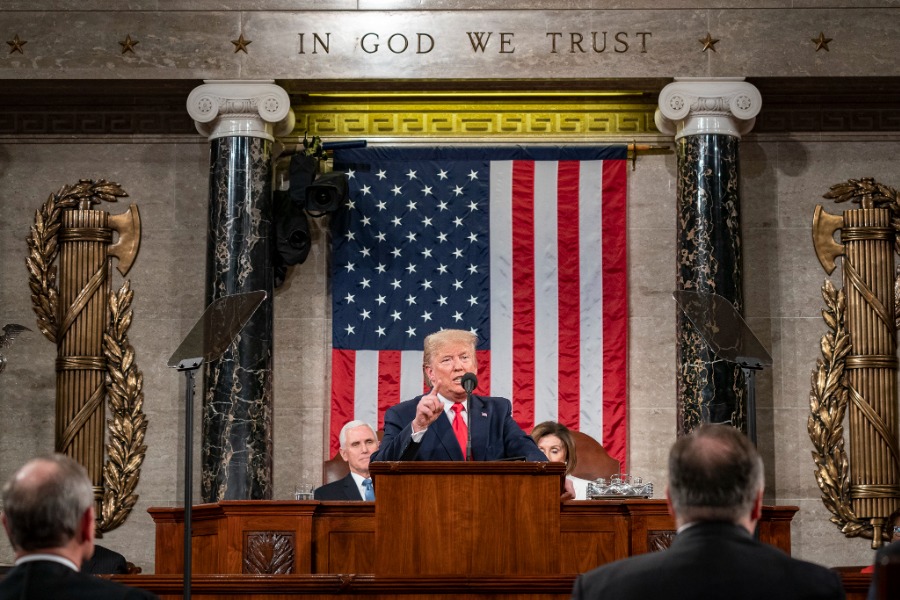Biden’s New Policy on Security Assistance, NSM-20, Will Not Save Gaza
While a step forward in some ways such as congressional reporting requirements, the policy memorandum’s loopholes and limitations will only create additional processes and maintain the status quo.

Published by The Lawfare Institute
in Cooperation With

On Feb. 8, President Biden issued National Security Memorandum-20 (NSM-20) on Safeguards and Accountability with Respect to Transferred Defense Articles and Defense Services. NSM-20 seeks to restate standards of current law and policy. The base text of the president’s policy was spurred by an amendment Sen. Chris Van Hollen (D-Md.) and 18 other senators filed a day before the president issued NSM-20. Although the amendment would have applied globally, just as this revised policy will, Van Hollen drafted the amendment text with Israel’s operations in Gaza front of mind.
Although NSM-20 is a step forward in some ways, specifically in helpful reporting requirements, it isn’t obvious how, in the context of Israel, this policy avoids being another performative measure, creating additional processes that keep policymakers and lawyers in the bureaucracy busy while maintaining the status quo with respect to arms transfers.
Consecutive administrations have refused to condition military aid to Israel on compliance with international law. U.S. presidents are loath to do so, even in the face of credible allegations of Israel authorizing illegal settlements, carrying out indiscriminate bombing, treating detainees inhumanely, or restricting food, water, and gas to Palestinian civilians. This has been the case even when the alleged actions run counter to relevant U.S. law or directly contradict the explicit policies of an administration.
Which is why it comes across as misleading that President Biden cites these laws and policies in NSM-20, a document based on the Van Hollen amendment, which was originally intended to put pressure on his administration to comply with them. If applied objectively, the president’s own Conventional Arms Transfer (CAT) Policy, the departments of State and Defense Leahy laws, and 620I of the Foreign Assistance Act—all of which are cited in NSM-20—arguably restrict some assistance to Israel. But so far, public reporting and indications from U.S. officials make clear that is not happening. (NSM-20 also references end-use monitoring requirements, though the State Department does not interpret them to mandate monitoring of actual use of equipment, but to strictly prevent diversion.)
Palestinians in Gaza don’t have time to wait on more government processes. Right now, more than 1.4 million of them are crammed into Rafah in the south, where Israel told them they would be safe from bombing in the north. Yet now Israeli Prime Minister Benjamin Netanyahu threatens to launch a ground invasion inside the city brimming with internally displaced Palestinians. President Biden is urging Netanyahu to have a plan to protect them, but in most plausible scenarios, military operations in Rafah would still be cataclysmic. The population density there alone—a result of Israel’s actions—creates insurmountable obstacles to conduct careful and lawful military operations, and the civilians there have nowhere left to go. As this crisis looms, it is hard to see NSM-20 doing much to stop it.
NSM-20 Requirements, Loopholes, and Limitations
The president’s policy memorandum does two things. First, for all future provisions of defense articles (defined in the Arms Export Control Act, 22 U.S.C. § 2794) provided via U.S.-granted assistance, it requires the secretary of state to obtain two kinds of “credible and reliable” written assurances from countries before the departments of State or Defense transfer those articles. (The policy leaves it to the secretaries of defense and state to apply the policy as appropriate to defense services.) Second, it lays out a framework of oversight reporting to Congress on partner state behavior and executive branch compliance with law and policy.
NSM-20 does not, however, mandate prohibitions on arms transfers if a recipient country is known to be violating international law or will more likely than not violate international law.
Though obvious from the text of NSM-20, and likely offered to avoid criticism, the White House made clear there are “no new standards in this memo,” saying that it simply spells out “the existing standards” in “international law, including the law of armed conflict.” And despite some officials describing NSM-20 as a “codification” or “law of the land,” the document is simply a policy. It is not binding; it can be superseded by President Biden and subsequent presidents.
Written Assurances
The “conditions” in NSM-20 (a generous term given the memo’s baked-in flexibility) are the written assurances from states before they can receive U.S. defense articles. There are two types of assurances the secretary of state must obtain: (a) the receiving state will use such U.S. defense articles in accordance with international humanitarian law (IHL) and, as applicable, other international law; and (b) the receiving state, in any area of armed conflict where it uses such defense articles, consistent with applicable international law, will facilitate and not arbitrarily deny, restrict, or otherwise impede, directly or indirectly, the transport or delivery of U.S. humanitarian assistance and U.S. government-supported international efforts to provide humanitarian assistance. NSM-20 provides a timeline for when assurances must be obtained. If assurances are not obtained within the timeline provided, the transfer of defense articles will be paused.
If the secretary of state or secretary of defense makes an assessment that the credibility or reliability of the assurances are called into question, they must report to the president within 45 days and indicate appropriate steps to remediate the situation. Their recommendations can range from cutting assistance to refreshing the assurances.
The rather significant loopholes in the policy are twofold. First, NSM-20 doesn’t apply to air defense systems, other defense articles intended for strictly defensive purposes (a challenging category to define), nonlethal defense articles, or transfers strictly for the operational needs of the Defense Department. Second, the secretaries of state and defense are allowed to apply a waiver “limited in time, scope and nature” to the requirement of written assurances “in rare and extraordinary circumstances justified by an imperative associated with the national security of the United States.” Waivers like this are available across dozens of foreign policy- and national security-related laws and are rarely challenged when applied.
Compliance With International Law
Obtaining assurances from Israel to comply with international law echoes a practice already in place. Biden officials have said they already require such assurances, although there appears to be a change of approach in how those assurances will be obtained. Assurances will now have to be in writing, “credible and reliable,” and provided by a “representative of the recipient country as the Secretary of State deems appropriate.” In this context, “credible” means that the assurances would be believable and “reliable” means the official offering the assurances is an authoritative person representing the state.
One challenge for the administration in assessing Israel’s follow-through on these assurances is Israel’s unique interpretations of how IHL constrains the conduct of hostilities. From my experience as an attorney in the Defense Department’s Office of General Counsel, International Affairs, Israel’s positions on IHL were typically aligned with the U.S. But there seem to have been clear points of contention between Israeli and U.S. views since Oct. 7, 2023, on how to appropriately apply core tenets of IHL to operations. For example, based on both public and private statements they made, U.S. officials appear to disagree with Israel on whether its operations in Gaza have been proportionate and discriminate, two fundamental requirements under IHL. Determining the credibility or reliability assurances to comply with IHL if the two states disagree on its application could be complicated, though likely to land in Israel’s favor given the U.S. government’s tendency to defer to operators.
Facilitating Humanitarian Access
NSM-20 describes the humanitarian assistance-related assurances as “in furtherance of supporting section 620I” of the Foreign Assistance Act of 1961 (22 U.S.C. 2378-1). This law prohibits U.S. assistance, including defense articles, from being furnished to a country that is restricting, directly or indirectly, the transport or delivery of U.S. humanitarian assistance. Despite the fact that public reporting indicates Israel has been restricting the delivery of life-saving provisions into Gaza throughout the war, Secretary of State Antony Blinken announced two transfers of military equipment to Israel in December 2023. No prohibition on assistance under 620I was in place. Sen. Van Hollen said on Feb. 12 that Israel’s actions are in violation of 620I, but the administration has not been able to answer him as to why this law is not being applied. Just this week, news broke that Israeli Finance Minister Bezalel Smotrich is preventing a shipment of U.S.-funded flour and other food from going into Gaza.
One severely limiting aspect of the humanitarian assistance-related assurances in NSM-20 is that they apply only to “any area of armed conflict where the recipient country uses such defense articles.” This narrow language is problematic for a few reasons. First, it is often the case that internally displaced persons or refugees, people who are in great need of aid, flee areas of active hostilities. Thus humanitarian assistance often goes to areas impacted by armed conflict, but where no weapons are being used or are rarely being used. Second, this creates a significant carve-out for countries that choose to strategically use U.S. weapons where they are willing to facilitate humanitarian assistance, but not in areas where they do not want to allow aid in. Third, because U.S. end-use monitoring requirements do not address actual use of weapons, there is no system in place to track a partner’s use of U.S. defense articles during armed conflict. That creates significant hurdles to making confident determinations about where exactly U.S. weapons are being used in areas of armed conflict. Finally, this reflects a larger issue of limitation within the entirety of NSM-20: The policy applies only to the use of U.S. defense articles and services, not the overall activities of a foreign force that might acquire its weapons from a range of sources.
Congressional Reporting
The congressional reporting requirements put forth in NSM-20 might be the stronger half of this policy. The secretaries of state and defense have 90 days to provide their first report to Congress, which must be in unclassified form but can be supplemented by classified reporting to the extent necessary. If comprehensive, the information provided to Congress could provide lawmakers with tools to conduct better oversight of arms transfers and the application of U.S. law.
The reporting requirements contain encouraging provisions related to credible reports of recipients committing violations of international law, end-use monitoring, the Pentagon’s new Civilian Harm Mitigation and Response Action Plan, and the Department of State’s Civilian Harm Incident Response Guidance, all of which are welcome attempts at transparency. One particularly significant step forward relates to Section 620I. The secretaries must report whether a recipient country is in compliance with the law, which will help ensure the executive branch is proactively assessing whether a state is restricting U.S.-provided humanitarian assistance.
Still, there are limitations in the reporting requirements. The secretaries can submit a description of challenges they face when conducting the required assessments, including whether or not there is available information that would even be responsive. This might seem minor at first, but it emphasizes the narrow nature of NSM-20. By applying only to U.S.-provided defense articles and services and not to broader conduct regardless of whether it involves U.S. provisions, NSM-20 reporting requirements might possibly be quite onerous to meet given the high burden of proving the origin of defense articles when incidents occur.
Political Pressure Is Vital to Prevent a Calamity
Sen. Van Hollen knew the Senate would not pass his amendment; the only alternative was to work with the White House to turn it into executive branch policy. Now that NSM-20 is in effect, Van Hollen can press Biden to apply it to its full extent, and he is wasting no time. Just days after the policy was announced, the senior lawmaker did not equivocate on the senate floor. He said:
Kids in Gaza are now dying from the deliberate withholding of food, in addition to the horror of that news, one other thing is true. That is a war crime. It is a textbook war crime and that makes those who orchestrate it war criminals. So now the question is what will the United States do? What will we do? What will President Biden do?
Van Hollen urged the president to take action and strictly adhere to NSM-20.
The senator’s work to apply pressure and encourage other lawmakers to do the same is vital to help prevent further calamity in Gaza. But biases toward Israel within the executive branch concerning arms transfers to Israel run deep. While working for the Defense Department, I personally witnessed the prejudice in application of the laws and policies already on the books. It is no different today, and I remain skeptical much will change.
U.S. officials say their priority is to insist Israel protect civilians in Gaza, but the administration has said it will continue to send arms to Israel and supports a new $14 billion military assistance package being debated in Congress. U.S. officials say their priority is to get as much humanitarian assistance into Gaza as possible, yet the Biden administration hastily suspended assistance to the United Nations Relief and Works Agency, the most capable organization to ensure aid to Palestinians. That could become a precedent for Congress to prohibit any future assistance to the critical UN body. And U.S. officials say they want peace for the region but refuse to call for a cease-fire despite there not being a military solution to this conflict.
All of the above undercuts the original intent of Sen. Van Hollen’s efforts and purported policy aims of NSM-20.
At a moment when Netanyahu is threatening a ground operation in Rafah and Israeli ministers are cutting off critical food supplies, the U.S. must do better than issue hollow policies that distract from the essential question: What is Washington going to do to bring this brutal war to an end?





